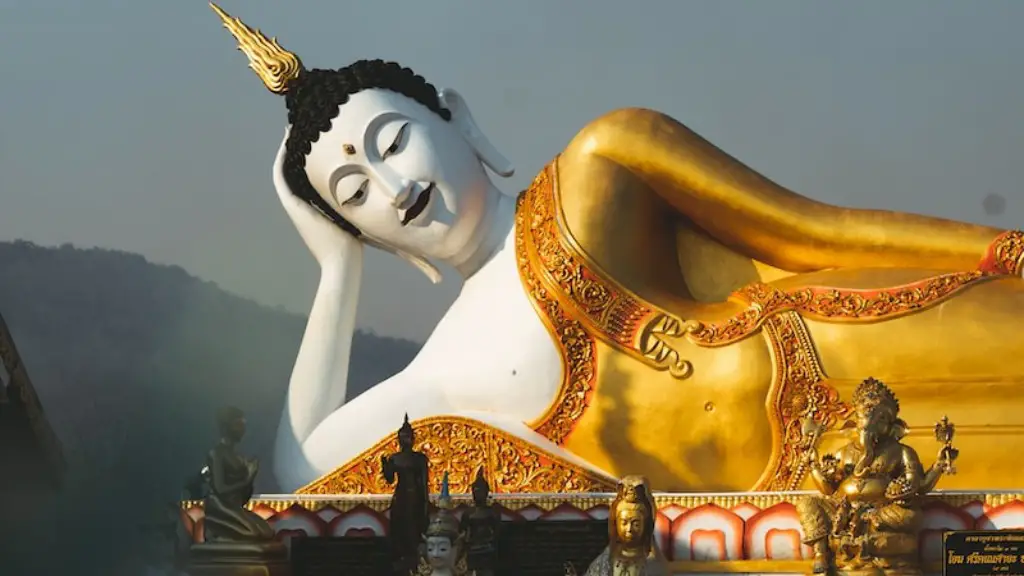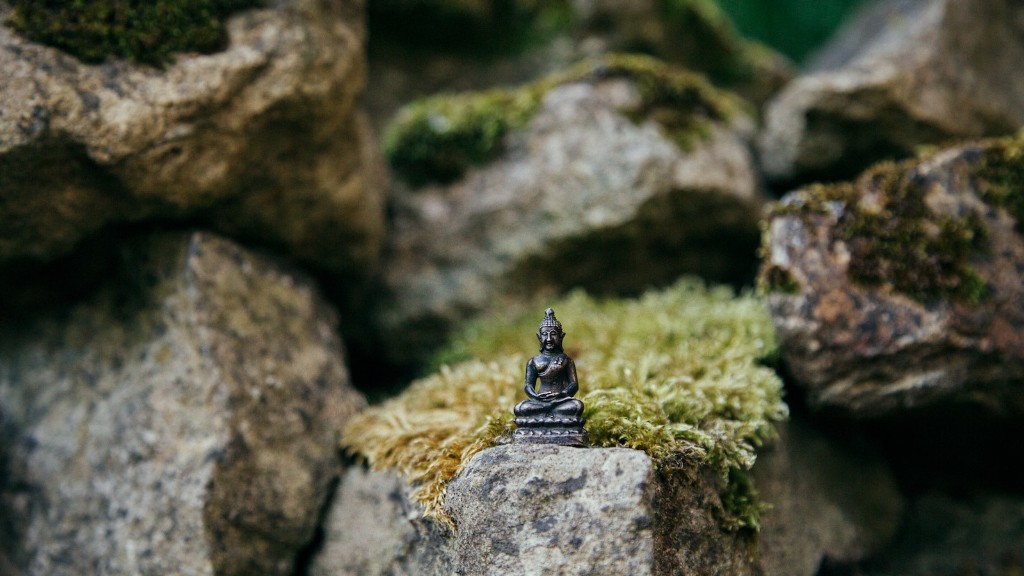Buddhism is a religion that is based on the teachings of Siddhartha Gautama, who was born in Nepal in the 6th century BC. Siddhartha Gautama was a prince who renounced his royal lifestyle and became a monk. He began to teach others about what he had learned about the nature of reality and the way to achieve liberation from suffering.
The main idea of Buddhism is that suffering is caused by attachment to things that are impermanent, and that the way to end suffering is to let go of attachment. Buddhists believe that the way to let go of attachment is through meditation and mindfulness.
The main idea of Buddhism is that suffering is caused by our attachments and desires, and that we can end our suffering by letting go of these attachments and desires.
What are the 3 main beliefs of Buddhism?
Buddhism is a religion that is based on the teachings of Siddhartha Gautama. The main principles of this belief system are karma, rebirth, and impermanence. Buddhism teaches that everything is connected and that our actions have consequences. We are also reborn after we die, and this cycle of birth and death is called samsara. This religion also believes that nothing is permanent and that change is the only constant in the universe.
The Five Precepts are guidelines for living a moral and ethical life. They are:
1. Refrain from taking life
2. Refrain from taking what is not given
3. Refrain from the misuse of the senses
4. Refrain from wrong speech
5. Refrain from intoxicants that cloud the mind.
Following these precepts will help us to live a good life and avoid causing harm to others.
Do Buddhist believe in God
Buddhism is a tradition that is focused on spiritual liberation and not on theistic beliefs. The Buddha himself rejected the idea of a creator god, and Buddhist philosophers have even argued that belief in an eternal god is nothing but a distraction for humans seeking enlightenment. This does not mean, however, that Buddhism is opposed to theism as a whole. Some Buddhists do believe in a god or gods, and this belief is perfectly compatible with the core teachings of Buddhism.
There are inherent and fundamental differences between Buddhism and Christianity. Christianity is at its core monotheistic and relies on a God as a Creator, while Buddhism is generally non-theistic and rejects the notion of a Creator God. Christianity believes in the existence of an afterlife and a heaven or hell, while Buddhism teaches that the cycle of rebirth ends when one achieves Nirvana. Christianity also teaches that Jesus is the only way to salvation, while Buddhism does not advocate any one path over another.
Who is the god of Buddhist?
In the East Asian Buddhist traditions, the most popular bodhisattvas are Guanyin, Maitreya, Samantabhadra, Manjushri, and Ksitigarbha. These bodhisattvas are all popular for their different qualities and attributes. Guanyin is known for her compassion and mercy, while Maitreya is known for his wisdom and love. Samantabhadra is known for his fearless nature and great strength, while Manjushri is known for his knowledge and understanding. Ksitigarbha is known for his boundless compassion and love.
The Four Noble Truths are the foundation of Buddha’s teachings, and though they leave much unexplained, they are still the truth of suffering, the truth of the cause of suffering, the truth of the end of suffering, and the truth of the path that leads to the end of suffering. By understanding these Four Noble Truths, we can begin to end our own suffering and find true happiness.
What is the first rule of Buddhism?
The Four Noble Truths are an important teaching in Buddhism that is accepted by all schools of Buddhism. The Four Noble Truths are: suffering is an inherent part of life; suffering is caused by our attachment to things that are impermanent; suffering can be ended by letting go of our attachment to impermanent things; and the path to the end of suffering is the Eightfold Path.
In Buddhism, there is no concept of punishment or reward and there is no divine being who decides who goes to hell or heaven There is merely the illusory results of our thought, words and deeds, which we call karma. Karma is the law of cause and effect, and it is this law that determines our destiny. We create our own karma through our thoughts, words and deeds, and it is this karma that decides our future.
Do Buddhists believe in afterlife
Buddhist teaching generally views life and death as a continuum, believing that consciousness (the spirit) continues after death and may be reborn. Death can be an opportunity for liberation from the cycle of life, death and rebirth.
There is no soul or self according to Buddhism, only a cycle of transmigration consisting of rebirth and redeath. This is the fundamental nature of existence.
Do Buddhist believe in the Holy Spirit?
There is no one specific answer to this question as Buddhists can have different beliefs about the existence (or non-existence) of deities and gods. Some Buddhists may believe in one or more gods or goddesses, while others may not believe in any at all. The important thing is that Buddhists focus on their own journey towards enlightenment and do not worry about what others believe.
Buddhism is a religion founded on the teachings of Siddhartha Gautama, who was born in India in the 6th century BCE. Siddhartha Gautama was born into a wealthy family and had the opportunity to receive a good education. He was married at a young age and had a son. Siddhartha Gautama was unsatisfied with his life of luxury and began to search for meaning. He studied with Hindu holy men, but was not satisfied with their answers. Siddhartha Gautama then decided to leave his family and go on a spiritual journey.
During his journey, Siddhartha Gautama became very interested in meditation. He eventually attained a state of enlightenment, or nirvana, which is a state of perfect peace. After Siddhartha Gautama attained enlightenment, he began to share his teachings with others. These teachings became the basis for the Buddhist religion.
Buddhism spread throughout Asia and eventually reached the West. Today, there are about 470 million Buddhists in the world.
Do Buddhists get along with Christians
There is a great deal of difference between the Christian and Buddhist beliefs. Christians preach of one God, creation and salvation, while Buddhists believe in reincarnation, enlightenment and nirvana. These beliefs are not compatible at all and it is difficult to see how one could believe in both.
When we pray to the buddhas, bodhisattvas, and spiritual masters, we are invoking the enlightened qualities of our own heart and mind. By letting go of the ego’s resistance to humility, we can connect with these higher beings and tap into their wisdom and guidance. These prayers can help us to let go of our own ego-centered perspective and open up to a wider view. In doing so, we can develop greater compassion and understanding for all beings.
Do Buddhists believe in karma?
For Buddhists, karma has very real implications that extend beyond this life. Bad actions from a previous life can actually follow a person into their next life and cause negative effects (which Westerners might interpret as “bad luck”). Even an Enlightened One is not exempt from the effects of past karma.
The Pali canon, also called the Tipitaka, is the complete canon of the Theravada branch of Buddhism. It is the oldest Buddhist canon, and was first recorded in Pali, the language of the Theravada tradition. The Pali canon consists of three baskets: the Vinaya Pitaka, the Sutta Pitaka, and the Abhidhamma Pitaka. The Vinaya Pitaka contains the rules and procedures for monastic life, the Sutta Pitaka contains the Buddha’s discourses, and the Abhidhamma Pitaka contains the Buddha’s philosophical teachings.
What is sin in Buddhism
Pāpa, apuñña or sin refers to the evil elements that defile the mind and have a deadening effect on the psyche, making it difficult for its upliftment. Buddhism does not believe in any personal God or any Supreme Being, so the word pāpa, apuñña or sin stands for the negative aspects of our own minds that we need to overcome.
The precepts are commitments to abstain from killing living beings, stealing, sexual misconduct, lying and intoxication. Within the Buddhist doctrine, they are meant to develop mind and character to make progress on the path to enlightenment.
Final Words
The main ideas of Buddhism are the Four Noble Truths, which are that life is suffering, that suffering is caused by desire, that suffering can be ended by eliminating desire, and that this can be achieved by following the Eightfold Path.
Buddhism is a religion focused on personal spiritual development. Buddhists strive for a deep understanding of themselves, others, and the world around them. They believe that this understanding can be achieved through practices like meditation and mindfulness. Buddhism also emphasizes compassion, kindness, and helping others.



